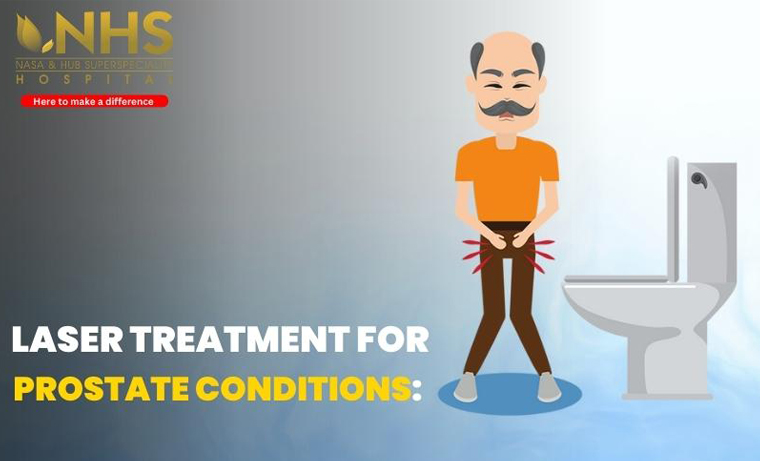
In a world of medical advancement, lasers shine as a symbol of optimism. Consider the prostate, a modest gland with a profound influence on men's well-being – here, laser technology is redefining our strategies for addressing health issues. Let's embark on the use of lasers in prostate care.
What is a Prostate Gland?
The prostate gland is a small, walnut-sized organ that is a part of the male reproductive system. It is present below the bladder and surrounds the urethra. Urethra is the tube that carries urine and semen out of the body.
The major function of the prostate gland is to produce and secrete a fluid known as the seminal fluid that makes up a significant portion of semen. Seminal fluid nourishes sperm. It helps them to survive and function effectively during ejaculation. There are many conditions that your prostate gland can be affected with, the most common one being non-cancerous enlargement of the prostate, also called BPH or Benign Prostate Hyperplasia. This is a condition most commonly found in men above the age of 50, and keeps progressing as they age. For such conditions, there are many management & treatment options, with Laser Treatment being one of the most preferred options.
An enlarged prostate restricts urine flow from the bladder, causing discomfort and frustration. This is where prostate laser surgery enters the scene. The procedure involves the use of laser technology to shrink or remove excess tissue from the prostate, facilitating the smooth flow of urine.
Laser Surgery for Prostate
Laser surgery for the prostate is a true boon, revolutionizing treatment for benign prostatic hyperplasia (BPH). With its precision and minimal invasiveness, it swiftly relieves urinary symptoms, offering rapid recovery and improved quality of life. This modern approach signifies a transformative leap in prostate care, highlighting the potential of medical progress to enhance the well-being of countless individuals.
Laser surgery is a safe and effective treatment for an enlarged prostate. The surgery is performed and the patient can be discharged the very same day. Recovery time is usually short and most patients experience significant improvement in their urinary symptoms within a few weeks.
Why Opt for Laser Surgery?
Here are some of the main benefits of Laser Surgery:
1. Minimally invasive:
Laser surgery is a minimally invasive procedure, which means less tissue damage and a shorter recovery time.
2. Effective
Laser surgery is an effective treatment for BPH, and it can provide long-lasting relief from urinary symptoms.
3. Safe
Laser surgery is a safe procedure, and the risks of complications are low.
4. Outpatient procedure
Laser surgery can be performed on an outpatient basis, which means that patients can go home the same day.
4. Outpatient procedure
Most patients experience a quick recovery after laser surgery, and they can return to their normal activities within a few weeks.
Trigger avoidance:
Identifying and avoiding triggers is an essential part of asthma management. Common triggers include allergens (such as pollen, dust mites, and pet dander), respiratory infections, air pollutants, tobacco smoke, and exercise. By minimizing exposure to triggers, individuals with asthma can reduce the frequency and severity of their symptoms.
Are there any risks involved with Laser Surgery?
While prostate laser surgery offers benefits, it's essential to be aware of potential risks, including temporary difficulty urinating, urinary tract infections, urethral narrowing, dry orgasm, and rare instances of erectile dysfunction. These risks, though present, are generally lower than those associated with traditional surgical methods.
Recovery and Beyond
Recovery varies – some patients return home on the same day, while others might require an overnight stay. Activities are limited initially, and your doctor's recommendations on resuming regular activities, sexual intercourse, and medication usage should be followed.
Lasting Results
Prostate laser surgery generally leads to improved urinary flow, offering long-lasting results. However, further treatment might be necessary if all tissue causing the obstruction isn't removed or regrows over time.
Seeking Professional Guidance
If you're experiencing urinary symptoms related to an enlarged prostate, consulting a healthcare professional is paramount. They can evaluate your condition, discuss treatment options, and guide you toward the most suitable approach.
Prostate laser surgery emerges as a transformative solution, breaking the barriers of traditional treatments and ushering in a new era of precision and efficiency. With minimal invasiveness, rapid recovery, and patient empowerment, this approach showcases the potential of medical advancements to enhance the quality of life. If you're navigating the challenges of an enlarged prostate, the guiding light of laser surgery could illuminate the path to a future free from discomfort and constraints.














